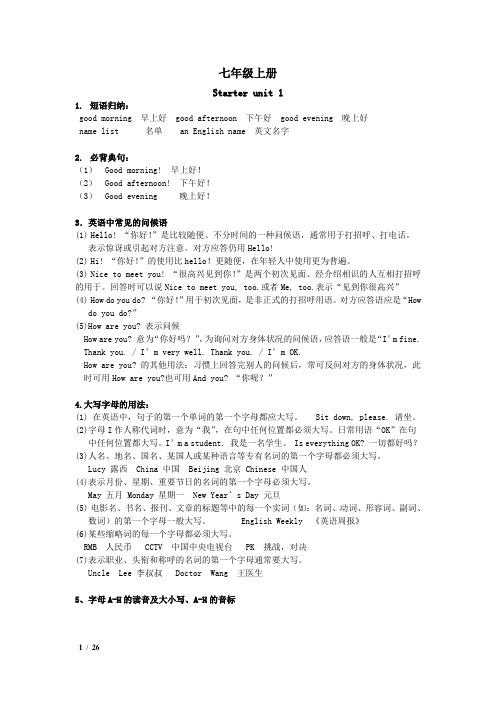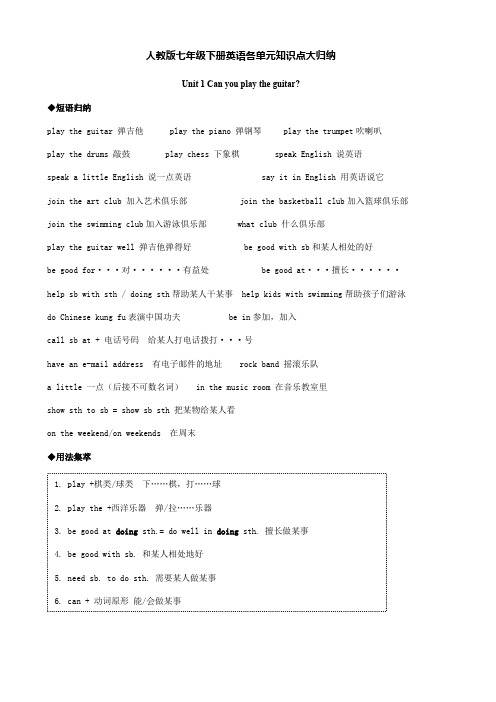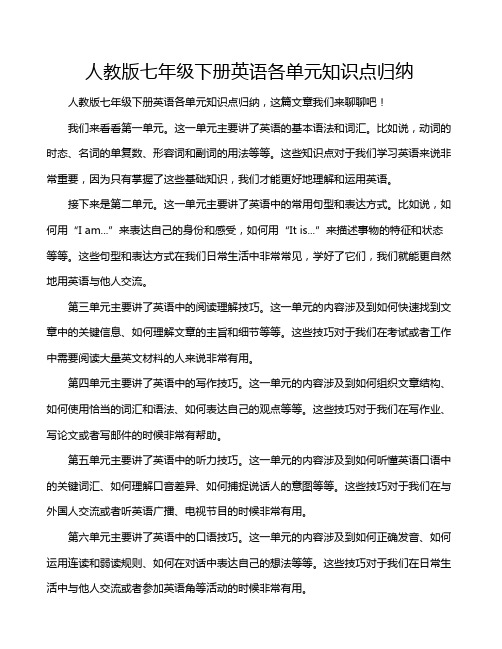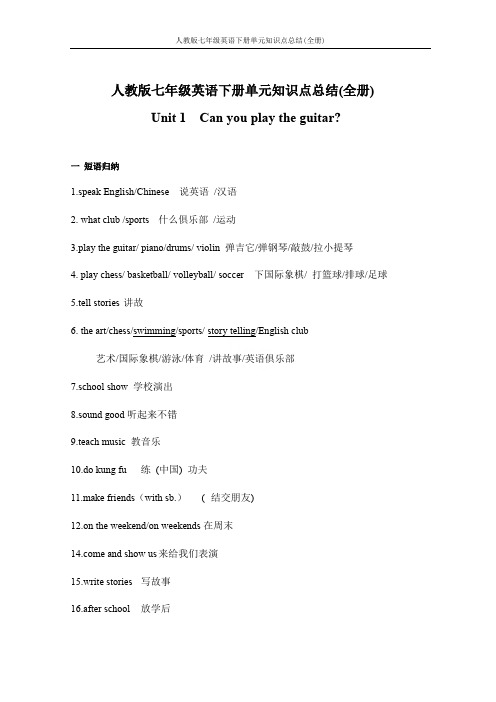初一下册英语1-6单元知识点人教版
新版人教版七年级英语上下册各单元知识点总结(精编完整版)

七年级上册Starter unit 11.短语归纳:good morning 早上好 good afternoon 下午好 good evening 晚上好name list 名单 an English name 英文名字2.必背典句:(1)Good morning! 早上好!(2)Good afternoon! 下午好!(3)Good evening 晚上好!3.英语中常见的问候语(1)Hello! “你好!”是比较随便、不分时间的一种问候语,通常用于打招呼、打电话。
表示惊讶或引起对方注意。
对方应答仍用Hello!(2)Hi! “你好!”的使用比hello!更随便,在年轻人中使用更为普遍。
(3)Nice to meet you! “很高兴见到你!”是两个初次见面、经介绍相识的人互相打招呼的用于。
回答时可以说Nice to meet you, too.或者Me, too.表示“见到你很高兴”(4)How do you do? “你好!”用于初次见面,是非正式的打招呼用语。
对方应答语应是“How do you do?”(5)How are you? 表示问候How are you? 意为“你好吗?”,为询问对方身体状况的问候语,应答语一般是“I’m fine. Thank you. / I’m very well. Thank you. / I’m OK.How are you? 的其他用法:习惯上回答完别人的问候后,常可反问对方的身体状况,此时可用How are you?也可用And you? “你呢?”4.大写字母的用法:(1) 在英语中,句子的第一个单词的第一个字母都应大写。
Sit down, please. 请坐。
(2)字母I作人称代词时,意为“我”,在句中任何位置都必须大写。
日常用语“OK”在句中任何位置都大写。
I’m a student. 我是一名学生。
Is everything OK? 一切都好吗?(3)人名、地名、国名、某国人或某种语言等专有名词的第一个字母都必须大写。
人教版七年级下册英语各单元知识点总结归纳

人教版七年级下册英语各单元知识点大归纳Unit 1 Can you play the guitar?◆短语归纳play the guitar 弹吉他 play the piano 弹钢琴 play the trumpet吹喇叭play the drums 敲鼓 play chess 下象棋 speak English 说英语speak a little English 说一点英语 say it in English 用英语说它join the art club 加入艺术俱乐部 join the basketball club加入篮球俱乐部join the swimming club加入游泳俱乐部 what club 什么俱乐部play the guitar well 弹吉他弹得好 be good with sb和某人相处的好be good for···对······有益处be good at···擅长······help sb with sth / doing sth帮助某人干某事 help kids with swimming帮助孩子们游泳do Chinese kung fu表演中国功夫 be in参加,加入call sb at + 电话号码给某人打电话拨打···号have an e-mail address 有电子邮件的地址 rock band 摇滚乐队a little 一点(后接不可数名词) in the music room 在音乐教室里show sth to sb = show sb sth 把某物给某人看on the weekend/on weekends 在周末◆用法集萃1. play +棋类/球类下……棋,打……球2. play the +西洋乐器弹/拉……乐器3. be good at doing sth.= do well in doing sth. 擅长做某事4. be good with sb. 和某人相处地好5. need sb. to do sth. 需要某人做某事6. can + 动词原形能/会做某事◆语法can 能;会;可以【用法】它本身有一定的含义,没有人称和数的变化,但不能单独作谓语,要和动词原形一起构成谓语。
人教英语七年级下册Unit1-Unit6知识点复习

U1一、词形变化1.dance v.跳舞dancer n. 舞者2.story 单数stories 复数3.teach v. 教;讲授teacher n. 教师teaches 三单4.music n.音乐musician n. 音乐人二、短语1.play chess下象棋2.join the chess club 加入象棋俱乐部3.speak English说英语3.join the English club 加入英语俱乐部4.play the drums敲鼓5.play the piano弹钢琴6..play the violin拉小提琴7.join the music club 加入音乐俱乐部8.tell stories讲故事9.join the story telling club参加讲故事俱乐部10.j oin the swimming club参加游泳俱乐部11..play soccer 踢足球12..play basketball打篮球13..play volleyball 打排球14..play ping-pang 打乒乓球15.j oin a sports club 加入运动俱乐部17.be good at doing sth擅长于做某事18.be good with善于应付...的19..be good for有益于20.be good to sb.对某人友好21.make friends with sb.和某人交朋友22..on the weekend/on weekends在周末23..teach sb. to do sth教某人做某事24.school show学校演出25..students wanted for...为...招募学生26..help sb. with sb.在某方面帮助某人27..help sb (to) do sth.帮助某人做某事28..talk to/with...和...交谈29.at the old people’s home 老人之家30.English-speaking students 说英语的学生31.do kung fu练(中国)功夫32.play the guitar well 弹吉他弹得好33.show sth to sb = show sb sth 把某物给某人看34. call sb at + 电话号码拨打某人的电话35. need sb. to do sth需要某人做某事36.want to do sth 想要做37.Students’ Sports Center学生运动中心38.music festival 音乐节U2一、词形变化1.brush v. brushes 三单2.tooth n. 牙齿teeth 复数3.fun n. 乐趣funny adj. 奇怪的,滑稽好笑的4.quick adj. 很快的quickly adv. 很快地5.life n.生命lives 复数二、短语1.get up起床;站起2.get dressed=put on(穿上衣服)3.take a shower洗淋浴4.at the radio station在广播电台5.do (one’s) homework做作业6.take a walk=go for a walk=have a walk散步6.either...or... 或者...或者(谓语动词就近原则)7.lots of(只可修饰不可数名词)=a lot of(可数不可数都可修饰)许多8.brush one’s teeth刷牙9.at night在夜里10.a t noon在中午11.c lean one’s home打扫房间12.taste good 尝起来好13.make breakfast/lunch/dinner早餐午晚餐15.ten to six五点五十16.half past eleven十一点半17. fifteen past nine =a quarter past nine九点十五18.fifteen to four =a quarter to four 三点四十五19.It’s time to do sth=It’s time for sth该做...的时间了20.h ave time to do sth./for sth 有时间做某事21.o n Friday afternoon在周五下午22.have a good day at school在度过美好的一天22.h ave a good job有一份好工作24.an hour and a half=one and a half hours一个半小时25.t ake exercise锻炼26.o n school days 在上学日27.have a healthy life 有一个健康的生活28.b e late for 干、、、迟到29.g o to bed 睡觉U3一、词形变化1.drive v.驾驶driver n.司机2.village n.村庄villager n.村民二、短语1.get to+地点到达2.take the/a subway=by subway=on the subway乘地铁3.ride a bike=by bike=on a bike骑自行车4.take a/the bus=by bus=on a bus 乘公交车5.take a/the car= by car=in one’s car乘车6.take a/the train=by train=on a train 乘火车7.walk=on foot 步行8.get home/there/here到家/到那儿/到这儿9.bus stop汽车站10.every day 每天11.between...and... 在...和...之间12.think of想起;对、、、的看法13.go on a ropeway乘索道14.be afraid of (doing)sth害怕(做)某事15.be afraid to do害怕去做某事16.two hundred teachers两百个老师17.how far多远距离18.how long多久时间19.It takes sb. some time to do sth 花费某人时间做某事20./be like a father to me对我来说像一个父亲21. drive his car to school开他的车去学校22.leave Beijing for Shanghai离开北京去上海23.It is one’s dream to do sth某人的梦想是...24.It is+adj+for sb. to do sth对于某人而言做某事...25.run too quickly流得太快26.no bridge=not a bridge没有一座桥27.thanks for +n /doing sth.为…而感谢28.an eleven-year-old boy一个11岁的男孩29.one hundred and five 105U4一、词汇拓展:feel (v. 感受,觉得;摸,触) — feeling (n.感情;感觉)important (adj. 重要的) — importance (n.重要;重要性)learn(v. 学习;学会) — learner (n.学习者)listen (v. 听;倾听) — listener (n.倾听者)luck (n. 幸运,运气) — lucky (adj.幸运的)noisy (adj. 喧闹的,嘈杂的) — noise (n.喧闹声,噪声)read [v. (朗)读] — reader [n.(朗)读者]relax (v. 放松,休息) — relaxing (adj.令人放松的) — relaxed(adj.放松的)二、短语梳理1.in class 在上课;在课上2.arrive late for class 上课迟到3.on time 准时4.in the hallways 在走廊里5.dining hall 餐厅6.listen to music 听音乐7.have to do必须;不得不8.school uniform 校服9.be quiet 安静10.go out外出(娱乐)11.a lot of=lots of 许多12.practice the guitar练习吉他practice doing sth 练习做、、、13.think about 考虑14.do the dishes 清洗餐具15.too many +名词复数太多too much +不可数名词much too +adj./adv. 太16.make one's bed 铺床17.get home 到家18.be strict with sb.in sth在某方面对某人要求严格19.follow the rules 遵守规则20.make rules 制订规则21.keep my hair short 留短发22.have fun doing玩得开心;过得愉快23.eat outside 在外面吃24.bring sb/sth to +地点把某人、某物带到某地25.good luck 好运U5一、词形变化1.Australia n. 澳大利亚Australian n.澳大利亚人adj, 澳大利亚的2.friend n. 朋友friendly adj. 友好的3.lose v. 迷路,丢失过去式lost4.Africa n.非洲african adj.非洲人的n.非洲人二、短语1.cut down trees砍伐树木2.all kinds of 各种各样的3.kind of 有点儿4.in the south 在南方5.in South Africa在南非6.save elephants 挽救大象7.save water节约水9.things made of ivory.象牙制品10.over three thousand三千多13.walk for a long time 长时间行走14.in the south of China 在中国南方15.sleep all day 整天睡觉16.all the year 整年e(be) from Africa来自非洲18.what animal(s) 什么动物19.help them(to) live 帮它们生存22.be made of .由---制成24.smart and friendly 聪明且友好25.be friendly to us 对我们友好26.what kind of animal(s)什么种类的动物27.one of Thailand's symbols泰国的象征之一28.kill elephants for ivory猎杀大象攫取象牙29.forget to do sth.忘记干某事30.forget doing sth.忘记干过某事31.in danger处于危险之中32.walk on two legs用两条腿走路33.like giraffes a lot(very much)非常喜欢长颈鹿34.the places with food and water 有食物和水的地方35.the importance in Thailand在泰国的重要性36.how to save tigers如何拯救老虎37.lose their homes 失去它们的家园38.a symbol of good luck好运的象征U61.watch TV看电视2. read a newspaper 看报纸3. talk on the phone 通过电话交谈4. listen to a CD 听CD5. a useful book 一本有用的书6. make soup 做汤7. wash the dishes 洗碟子8. go to the movies 去看电影9. at home 在家10. eat out 在外面吃11. drink tea 喝茶12.Dragon Boat Festival 端午节13. make zongzi 包粽子14. watch the boat races on TV 看龙舟比赛15. the night before the festival 节日前的晚上16. any other night 任何其他的晚上17. his host family 他的寄宿家庭18. read a story to sb 读故事给某人19. miss sb. 思念某人miss doing sth 错过做某事miss the bus 错过公交车20. wish to do sth希望做某事wish sb to do sth希望某人做某事hope to do sth希望做某事21. no place like home 没有地方像家一样22. in the United States 在美国23. study for a test 为一个考试而学习。
期末复习人教版英语七年级下册单元重点知识点语法汇总

人教版七年级下册-单元重点语法汇总U1情态动词can的用法can是情态动词,意为“能,会”,表示某人或某物具备的能力,还可用来提出请求,没有人称和数的变化,后面直接接动词原形。
下面学习情态动词can的常见用法。
1.表示“能力”,意为“能,会”。
例句:I can speak English.我会讲英语。
2.表示“请求”或“许可”。
例句:Can you help me with my Chinese?你能帮我学汉语吗?You can go to the park after you finish your homework.你做完作业后可以去公园。
3.含有情态动词can的肯定句变否定句时,需在can后加not,其缩写形式为can’t;变疑问句时,情态动词can直接放在句首,构成一般疑问句。
例句:I can sing English songs.我会唱英文歌。
(肯定句)→I can’t sing English songs.我不会唱英文歌。
(否定句)Yao Ming can play basketball.姚明会打篮球。
→Can Yao Ming play basketball?姚明会打篮球吗?(一般疑问句)4.对Can…问句的回答可以用下面几种形式:对询问能力的问句的回答可以说“Yes,…can.”或“No,…can’t.”,表示对能力的肯定或否定;对表示请求的问句的回答可以说“OK./All right.”,表示同意对方的请求。
也可用certainly或sorry来回答。
用certainly作肯定回答,语气更肯定;用sorry作否定回答,语气则更委婉、客气。
例句:—Can you speak English?你会说英语吗?—Yes,I can.是的,我会。
—Can I see your pencil-box,please?请问,我可以看一下你的铅笔盒吗?—All right./Certainly.Here you are.可以。
人教版七年级下册英语各单元知识点归纳

人教版七年级下册英语各单元知识点归纳人教版七年级下册英语各单元知识点归纳,这篇文章我们来聊聊吧!我们来看看第一单元。
这一单元主要讲了英语的基本语法和词汇。
比如说,动词的时态、名词的单复数、形容词和副词的用法等等。
这些知识点对于我们学习英语来说非常重要,因为只有掌握了这些基础知识,我们才能更好地理解和运用英语。
接下来是第二单元。
这一单元主要讲了英语中的常用句型和表达方式。
比如说,如何用“I am...”来表达自己的身份和感受,如何用“It is...”来描述事物的特征和状态等等。
这些句型和表达方式在我们日常生活中非常常见,学好了它们,我们就能更自然地用英语与他人交流。
第三单元主要讲了英语中的阅读理解技巧。
这一单元的内容涉及到如何快速找到文章中的关键信息、如何理解文章的主旨和细节等等。
这些技巧对于我们在考试或者工作中需要阅读大量英文材料的人来说非常有用。
第四单元主要讲了英语中的写作技巧。
这一单元的内容涉及到如何组织文章结构、如何使用恰当的词汇和语法、如何表达自己的观点等等。
这些技巧对于我们在写作业、写论文或者写邮件的时候非常有帮助。
第五单元主要讲了英语中的听力技巧。
这一单元的内容涉及到如何听懂英语口语中的关键词汇、如何理解口音差异、如何捕捉说话人的意图等等。
这些技巧对于我们在与外国人交流或者听英语广播、电视节目的时候非常有用。
第六单元主要讲了英语中的口语技巧。
这一单元的内容涉及到如何正确发音、如何运用连读和弱读规则、如何在对话中表达自己的想法等等。
这些技巧对于我们在日常生活中与他人交流或者参加英语角等活动的时候非常有用。
第七单元主要讲了英语中的文化知识。
这一单元的内容涉及到英美文化的差异、英国历史和地理等方面的知识。
了解这些知识可以帮助我们更好地理解和运用英语,同时也可以增进我们对不同文化的理解和尊重。
人教版七年级下册英语各单元知识点归纳是非常重要的一本书,它涵盖了许多我们在学习英语过程中需要掌握的基础知识和技能。
人教版七年级英语下册单元知识点总结(全册)

人教版七年级英语下册单元知识点总结(全册)Unit 1 Can you play the guitar?一短语归纳1.speak English/Chinese 说英语/汉语2. what club /sports什么俱乐部/运动3.play the guitar/ piano/drums/ violin 弹吉它/弹钢琴/敲鼓/拉小提琴4. play chess/ basketball/ volleyball/ soccer 下国际象棋/ 打篮球/排球/足球5.tell stories讲故6. the art/chess/swimming/sports/ story telling/English club艺术/国际象棋/游泳/体育/讲故事/英语俱乐部7.school show 学校演出8.sound good听起来不错9.teach music 教音乐10.do kung fu练(中国) 功夫11.make friends(with sb.)(结交朋友)12.on the weekend/on weekends在周末e and show us来给我们表演15.write stories写故事16.after school放学后17.English-speaking students说英语的学生18.play games 做游戏19.the Students’ Sports Center学生运动中心20.at the old people’s home在老人之家21.be in our school music festival 参加学校音乐节22.jion the music club加入音乐俱乐部二用法集萃1. play +棋类/球类下……棋,打……球2. play the +乐器弹/拉……乐器3. be good at doing sth.擅长做某事be good for.. 对… 有好处be good /kind to … 对… 友好4. be good with sb. 和某人相处地好; 善于应付(处理)…5. need(sb./sth.)to do… 需要(某人/某物)做….6. can + 动词原形能/会做某事7. a little + 不可数名词: 一点儿……9. like to do sth.或like doing sth. 喜欢做某事10.want to do…想做……11.What about…?…怎么样?(后面接Ving/代词/名词)12. talk用法: talk to/with sb. 跟某人说话talk about sth. 谈论某事tell 用法:tell sb sth. 告诉某人某事tell sb to do sth 告诉某人去做某事tell stories 讲故事say用法:say直接加说话的内容/itspeak用法:speak +语言13.help sb. with sth在某方面帮助某人= help sb.(to)do sth14.be free /busy有空/很忙15. call sb. at+号码拨打某人的……号码16. be in=join …成为…中的一员(P6)17.want …for the school show为学校表演招聘……三典句必背1. Can you draw? 你会画画吗?Yes, I can. / No, I can’t.是,我会。
人教版七年级下册英语各单元知识点总结

人教版七年级下册英语各单元知识点归纳如下:第一单元:1. 描述人的外貌特征的形容词:tall/short/tall and short/thin/fat/thin and fat/kind/nice/good-looking2. 询问别人名字的句型:What's your name?3. 介绍自己并问候的句型:Hello/Hi, my name is... Nice to meet you.第二单元:1. 询问别人年龄的句型:How old is...?2. 询问别人住在哪里的句型:Where do/does... live?3. 描述国家的形容词:China/England/America/Canada等第三单元:1. 表示频率的短语:never/always/usually/often/sometimes2. 表示喜欢不喜欢的一般疑问句:Do you like...? Yes, I do. /No, I don't.3. 描述食品和饮料的单词:fruit/cake/hamburger/bread/noodles等第四单元:1. 表示身体部位的单词:head/face/nose/mouth/eye/ear2. 表示颜色的单词:red/green/blue/yellow等3. 表示服装的单词:shirt/coat/pants/skirt/jeans等第五单元:1. 询问别人是否做某事的句型:Do you play...? Yes, I do. /No, I don't.2. 表示运动的单词:basketball/volleyball/ping-pong/swimming等第六单元:1. 表示位置关系的短语:next to/behind/in front of/in the corner等2. 表示动作方向的短语:come in/go out/turn left/turn right等3. 表示顺序的短语:st等第七单元:1. 询问别人是否同意自己观点的句型:Do you agree with me? Yes, I do. /No, I don't quite.2. 表示同意或不同意的短语:agree with sb./agree to sth./agree to do sth./agree to disagree on sth.等。
人教英语七年级下册知识点

人教英语七年级下册知识点人教英语七年级下册共分为六个单元,分别是“Unit 1 My School”,“Unit 2 This is my sister”,“Unit 3 Is this your pencil?”,“Unit 4 Where’s my backpack?”,“Unit 5 Do you have a soccer ball?”和“Unit 6 What’s your favorite subject?”。
以下将详细介绍每个单元内的知识点。
Unit 1 My School1. 学校设施的表达方法,如playground、canteen、library等。
2. 英语中询问地点的疑问句结构及肯定回答、否定回答,如“Where is the gym?”和“It’s not here.”。
3. 英语中表示归属关系的名词所有格的用法,如“My father's car is red.”。
Unit 2 This is my sister1. 家庭成员的称呼及表达方法,如mother、father、sister、brother等。
2. 英语中询问身份的疑问句结构及肯定回答、否定回答,如“Is she your sister?”和“Yes, she is.”。
3. 英语中表示所有物的物主代词的用法,如“her book”和“his pen”。
Unit 3 Is this your pencil?1. 学习询问和表达物品所有者的语句结构,如“Is this your pencil?”和“No, it’s not mine. It’s Jack’s.”。
2. 学习询问和表达物品的名称的疑问句结构及肯定回答、否定回答,如“Is this a pencil?”和“Yes, it is.”。
3. 学习数词和颜色词的表达方法,如“two, three, blue, red”等。
Unit 4 Where’s my backpack?1. 学习问路及表述方向的语句结构,如“Excuse me, where is the post office?”和“Go straight and turn left.”。
- 1、下载文档前请自行甄别文档内容的完整性,平台不提供额外的编辑、内容补充、找答案等附加服务。
- 2、"仅部分预览"的文档,不可在线预览部分如存在完整性等问题,可反馈申请退款(可完整预览的文档不适用该条件!)。
- 3、如文档侵犯您的权益,请联系客服反馈,我们会尽快为您处理(人工客服工作时间:9:00-18:30)。
初一下册英语1-6单元知识点人教版
Unit 1 Can you play the guitar ?
1、can+动词原形,它不随主语和数而变化。
(1)含有can的肯定句:主语+can+谓语动词的原形+其他。
(2)变一般疑问句时,把can提前:Can+主语+动词原形+其他?
肯定回答:Yes,主语+can。
否定回答:No,主语+can't.
(3)含有can的否定句:主语+can't+动词的原形+其他。
(4)含有can的特殊疑问句:特殊疑问词+can+主语+动词原形+其他?
2、may+动词的原形。
(may为情态动词)一般疑问句是把may提前,
肯定回答是:Yes,主语 +may。
否定回答是:No,主语+mustn't。
或please don't。
join+某个组织,俱乐部,party,参军,党派等“加入”
Join sb. “参加到某人中” join in (doing)sth “加入做......,参加某个活动” Join in=take part in +活动,比赛
3、说某种语言:speak+语言
4、play+球、棋、牌;play+the+乐器。
5、擅长于(做)什么:be good at +名词/动ing
6、协助某人做某事:help sb. (to ) do sth. help sb. with sth.
7、我能知道你名字吗?May I know your name?
8、想要做什么:want to do sth 例如:I want to learn about art.
9、What club do you want to join?
I want to join the chess club and the basketball club.
10、What club does Tom want to join? He wants to join the swimming club .
11、He can’t play the violin or the piano. Can you help kids with swimming?
12、Why do you want to join the English club? Because I want to learn English well.
Unit 2 What time do you go to school ?
1、what time和when引导的特殊疑问句。
(1)对时间提问用what time,也能够用when。
询问钟点时用what time,询问日期、月份、年份时用when。
(2)询问做某事的时间时,两者能够互换。
(3)其他询问时间的句子:
What's the time? =What time is it?现在几点了?
时刻表达法:顺读法和逆读法。
(1)顺读法:“钟点+分钟”直接读数字。
(2)逆读法:借助介词past或to表示,要先说分再说钟点。
A.当分钟不超过30分钟时(包括30分钟),即30,用to表示。
其结构为:“所差分钟(即60—所
过度钟数)+to+下一个整点”,to译成“差”,差几分钟到几点。
C.当分钟为30分钟用half表示,当分钟为15分钟用a quarter。
2、always 总是>usually 通常>often常常>sometime 有时
3、Watch+TV、球赛“观看,观赏”,特指长时间注视。
See+电影、医生“看见”,强调看的结果。
Look “看”,强调看的动作,look后接宾语时要用介词at。
Read+书刊、杂志“阅读”
4、listen to +宾语 6、Take a shower “淋浴” 7、Eat breakfast 吃早餐
5、Go to +地点名词如:go to school go+地点副词如:go home
Unit 3 How do you get to school?
一、本单元知识点总结
1.get to school 到校
2.take the subway 乘地铁
3.take the train 坐火车
4.leave for 到……地方去,离开去
某地
5.take…to…把……带到……
6. most students 绝大部分学生
7. from…to…从……到…… 8.think of 想到,想起
9.ride bikes 骑自行车 10.in other parts of the world 在世
界的其他地方
11. how far 多远 (路程、距离) 12.how long多长(时间)
13.take the train to school 乘火车去上学 14.in places 在
一些地方。
